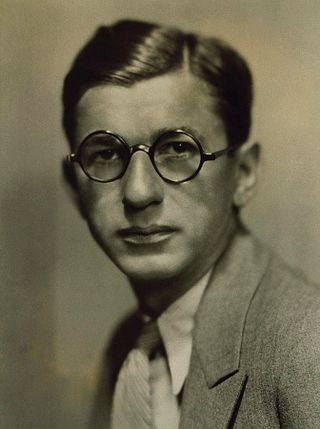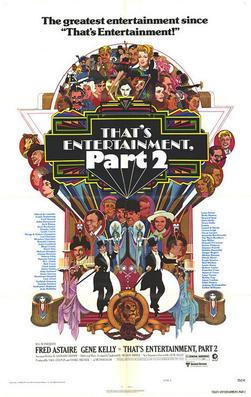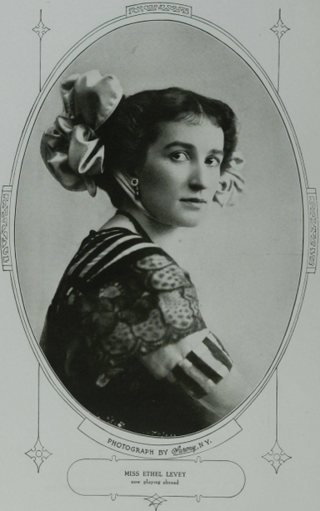Plot
This article needs an improved plot summary.(June 2023) |
Yes, Yes, Yvette takes place on Presidents' Day in Palm Beach, Florida. [2]
Yes, Yes, Yvette is a musical in three acts with lyrics by Irving Caesar and music by Philip Charig and Ben Jerome. James Montgomery and William Cary Duncan co-authored the musical's book which was based on Montgomery's 1916 play Nothing But the Truth which was in turn based on Frederic S. Isham's 1914 novel Nothing But the Truth . [1] Producer Harry Frazee envisioned the work as a follow-up to the 1925 hit musical No, No, Nanette , a work which he had brought to the stage, and the work was billed as a companion piece to Nanette. [2] Many of the cast members from Nanette's successful Chicago production also starred in Yvette. [2]
Yes, Yes, Yvette premiered in Chicago at the Four Cohans Theatre on December 5, 1926. [1] Like its predecessor No, No, Nanette, the musical was warmly received by Chicago audiences but not by New York City ones, and had a much longer stage life in the Windy City. [2] The premiere cast included Jeanette MacDonald as Yvette Ralston, Lynne Overman as Robert Bennett, Herbert Corthell as S. M. Ralston, Leo Henning as Dick Donnelly, Jere Delaney as Mr. Van Dusen, Arnold Lucy as Bishop Doran, Leslie Stiles as J. P. Clark, Grace Studiford as Mrs. Ralston, Amy Revere as Ethel Clark, Helen Lynd as Mabel Terry, and Madelyn Killeen as Sabel Terry. [1]
After several months of performances in Boston and Philadelphia, Yes, Yes, Yvette opened on Broadway at the Sam H. Harris Theatre on October 3, 1927. [3] A flop in New York, it played for just 40 performances at that theatre, closing on November 5, 1927. [4] The Broadway cast starred Jeanette MacDonald as Yvette Ralston, Jack Whiting as Robert Bennett, Charles Winninger as S. M. Ralston, Roland Woodruff as Dick Donnelly, Joseph Herbert as Mr. Van Dusen, Arnold Lucy as Bishop Doran, Frederick B. Manatt J. P. Clark, Virginia Howell as Mrs. Ralston, Brenda Bond as Ethel Clark, Helen Lynd as Mabel Terry, and Dorothy Waterman as Sabel Terry. [3] Sammy Lee choreographed the Broadway production.
This article needs an improved plot summary.(June 2023) |
Yes, Yes, Yvette takes place on Presidents' Day in Palm Beach, Florida. [2]

Otto Abels Harbach, born Otto Abels Hauerbach was an American lyricist and librettist of nearly 50 musical comedies and operettas. Harbach collaborated as lyricist or librettist with many of the leading Broadway composers of the early 20th century, including Jerome Kern, Louis Hirsch, Herbert Stothart, Vincent Youmans, George Gershwin, and Sigmund Romberg. Harbach believed that music, lyrics, and story should be closely connected, and, as Oscar Hammerstein II's mentor, he encouraged Hammerstein to write musicals in this manner. Harbach is considered one of the first great Broadway lyricists, and he helped raise the status of the lyricist in an age more concerned with music, spectacle, and stars. Some of his more famous lyrics are "Smoke Gets in Your Eyes", "Indian Love Call" and "Cuddle up a Little Closer, Lovey Mine".
This is a list of notable events in music that took place in the year 1924.

Ethel Ruby Keeler was an American actress, dancer, and singer who was paired on-screen with Dick Powell in a string of successful early musicals at Warner Bros., particularly 42nd Street (1933). From 1928 to 1940, she was married to actor and singer Al Jolson. She retired from show business in the 1940s, but made a widely publicized comeback on Broadway in 1971.

No, No, Nanette is a musical comedy with lyrics by Irving Caesar and Otto Harbach, music by Vincent Youmans, and a book by Otto Harbach and Frank Mandel, based on Mandel's 1919 Broadway play My Lady Friends. The farcical story involves three couples who find themselves together at a cottage in Atlantic City, New Jersey, in the midst of a blackmail scheme, focusing on a young, fun-loving Manhattan heiress who naughtily runs off for a weekend, leaving her unhappy fiancé. Its songs include the well-known "Tea for Two" and "I Want to Be Happy".

Jeanette Anna MacDonald was an American singer and actress best remembered for her musical films of the 1930s with Maurice Chevalier and Nelson Eddy. During the 1930s and 1940s she starred in 29 feature films, four nominated for Best Picture Oscars, and recorded extensively, earning three gold records. She later appeared in opera, concerts, radio, and television. MacDonald was one of the most influential sopranos of the 20th century, introducing opera to film-going audiences and inspiring a generation of singers.

Howard Dietz was an American publicist, lyricist, and librettist, best remembered for his songwriting collaboration with Arthur Schwartz.

Irving Caesar was an American lyricist and theater composer who wrote lyrics for numerous song standards, including "Swanee", "Sometimes I'm Happy", "Crazy Rhythm", and "Tea for Two", one of the most frequently recorded tunes ever written. In 1972, he was inducted into the Songwriters Hall of Fame.

I Married An Angel is a 1938 musical comedy by Rodgers and Hart. It was adapted from a play by Hungarian playwright János Vaszary, entitled Angyalt Vettem Felesegul. The book was by Richard Rodgers and Lorenz Hart, with music by Rodgers and lyrics by Hart. The story concerns a wealthy banker who, disillusioned with women, decides that the only mate for him would be an angel. An angel soon arrives, and he marries her, but finds out that her perfection and guilelessness are inconvenient.

That's Entertainment, Part II is a 1976 American compilation film released by Metro-Goldwyn-Mayer and a sequel to That's Entertainment! (1974). Like the previous film, That's Entertainment, Part II was a retrospective of famous films released by MGM from the 1930s to the 1950s. Some posters for the film use Part 2 rather than Part II in the title.
Harry Akst was an American songwriter, who started out his career as a pianist in vaudeville accompanying singers such as Nora Bayes, Frank Fay and Al Jolson.
George M! is a Broadway musical based on the life of George M. Cohan, the biggest Broadway star of his day who was known as "The Man Who Owned Broadway." The book for the musical was written by Michael Stewart, John Pascal, and Francine Pascal. Music and lyrics were by George M. Cohan himself, with revisions for the musical by Cohan's daughter, Mary Cohan.
The Cat and the Fiddle is a musical with music by Jerome Kern and book and lyrics by Otto Harbach. The story is about love and conflict between an American popular music composer and a European classical composer. Hit numbers from the show included "Try to Forget", "She Didn't Say Yes", "The Breeze Kissed Your Hair" and "The Night Was Made for Love."

George Michael Cohan was an American entertainer, playwright, composer, lyricist, actor, singer, dancer and theatrical producer.
Philip 'Phil' Charig was an American composer, lyricist, songwriter, and pianist. He began his career in the early 1920s as a pianist and composer with the band leader Ben Bernie. He created stage works for both the New York and London stages; of which the best known is Follow the Girls (1944). He also composed music for American television and film. He was nominated for the Academy Award for Best Original Song at the 11th Academy Awards for the song "Merrily We Live" from the 1938 film of the same name.

Ethel Levey, born Grace Ethelia Fowler, was an American actress, dancer, and singer in musical theatre and on the vaudeville stage. She was the first wife of George M. Cohan, and the second wife of aviator Claude Grahame-White.

Jack Whiting was an American actor, singer and dancer whose career ran from the early 1920s through the late 1950s, playing leading men or major supporting figures.
Nothing But the Truth is a 1914 comedy novel by the American writer Frederic S. Isham. It was adapted into a hit 1916 Broadway play of the same title.
Helen Lynd, also known as Helene Lynch, was an American actress and comedienne active on stage and in film.
Benjamin M. Jerome, also known by the stage name Ben Jerome, was an American composer, arranger, lyricist, songwriter, pianist, and conductor. In his early career he worked in New York City as a Tin Pan Alley composer of popular music, and was a notable arranger of ragtime music. He also composed music and/or wrote lyrics to several musicals staged on Broadway. He later lived in Chicago where he worked for 12 years as the music director of the La Salle Theater.
James H. Montgomery was an American playwright, screenwriter, theatre producer, and actor.